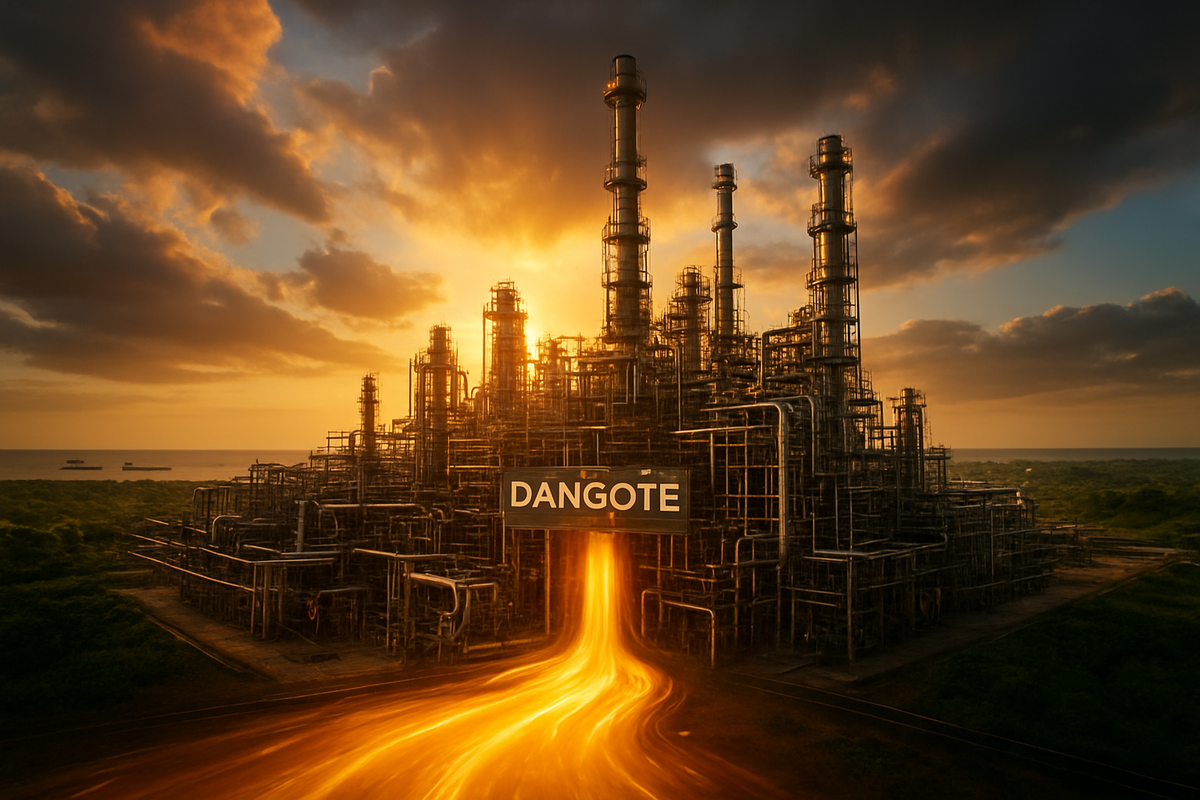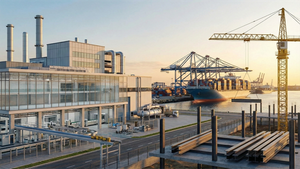Financial News
Dangote Refinery: Reshaping Nigeria's Fuel Market Amidst Fierce Competition

The Dangote Refinery, a monumental $20 billion investment, is fundamentally redrawing Nigeria's downstream petroleum landscape, presenting both significant opportunities and immediate challenges for established fuel importers as of November 25, 2025. With its operational capacity steadily increasing, the refinery is actively reshaping market dynamics, though not without facing its own technical and market-related hurdles. This transformative shift is poised to move Nigeria from a perennial importer of refined products to a self-sufficient nation, and potentially a regional exporter, directly challenging the long-standing business models of traditional fuel marketers and opening new avenues for economic growth.
The immediate implications are profound: a noticeable reduction in petrol pump prices, a significant step towards energy self-sufficiency, and a burgeoning competition that is forcing established players to adapt or risk market erosion. The refinery's strategic interventions have not only brought relief to consumers through price moderation but also contributed to ending the perennial artificial fuel scarcity often experienced during peak demand periods, marking a pivotal moment in Nigeria's quest for energy independence.
A New Dawn: Unpacking the Dangote Refinery's Market Revolution
The Dangote Refinery, a colossal 650,000 barrels per day (bpd) integrated refinery located in Nigeria's Lekki Free Zone, has profoundly reshaped the country's downstream petroleum market. As of late 2025, the refinery is not only operational but also embarking on a significant expansion to 1.4 million bpd by 2028 through a strategic partnership with Honeywell International Inc. (NASDAQ: HON). This development has created a ripple effect, leading to both beneficiaries and those facing significant challenges within Nigeria's downstream petroleum market.
Between November 1 and 15, 2025, the refinery produced and distributed 438 million litres of petrol across Nigeria, a strategic effort aimed at mitigating the traditional "ember month" fuel scarcity. In a clear demonstration of its market influence, the refinery reduced its petrol gantry price from N877 to N828 per litre (a 5.6% decrease) on November 6, 2025, with coastal prices dropping to N806. This price adjustment, initiated by Dangote independently of federal government tariff changes, prompted other marketers to follow suit, offering long-awaited relief to Nigerian consumers. The refinery has consistently supplied high-quality petroleum products, characterizing the continued importation of lower-quality products as "dumping."
The journey of the Dangote Refinery has been extensive and marked by several critical milestones. Construction officially commenced in 2016, and the refinery was formally commissioned by then-President Muhammadu Buhari on May 22, 2023. Production officially began on January 12, 2024, with diesel and aviation fuel, followed by consistent exports of naphtha, gasoil, and low-sulfur fuel oil (LSFO) since March 2024, and gasoline (91 RON) by October 2024. A key development on November 25, 2025, is the announcement of a strategic partnership between Dangote Refinery and Honeywell International Inc. (NASDAQ: HON), aiming to double the refinery's capacity to 1.4 million bpd by 2028, which would make it the world's largest single-location refining complex. However, the refinery faced a temporary setback in gasoline production in late August 2025 due to catalyst leaks in its Residue Fluidized Catalytic Cracking Unit (RFCCU), with repairs projected for completion by early November 2025.
Key players and stakeholders involved include Aliko Dangote and Dangote Group, the visionary founder and primary owner; Nigerian National Petroleum Company Limited (NNPC Limited), which held a 20% stake, now reduced to 7.2%; the Nigerian Midstream and Downstream Petroleum Regulatory Authority (NMDPRA), the primary regulatory body; and various Independent Petroleum Marketers Association of Nigeria (IPMAN) and other Petroleum Marketers who are directly impacted by the refinery's pricing and distribution strategies. Honeywell International Inc. (NASDAQ: HON) is a crucial strategic partner, supplying advanced technologies and equipment. Initial market reactions have been mixed, with widespread relief over price stabilization and scarcity alleviation, but also concerns from smaller marketers about potential monopolistic influence and the rendering idle of existing depots. The refinery is widely seen as a transformative asset capable of drastically cutting Nigeria's $25-30 billion annual fuel import bill, strengthening the Naira, and stabilizing pump prices.
Winners and Losers: The Shifting Sands of the Nigerian Fuel Market
The Dangote Refinery's operationalization and ambitious expansion plans are fundamentally restructuring Nigeria's downstream petroleum market, creating distinct winners and losers among public companies and industry players.
On the losing side are public companies that have historically relied heavily on the importation of refined petroleum products. TotalEnergies Marketing Nigeria Plc (NGX: TOTALENERG) recorded a significant loss of ₦14.1 billion ($9.67 million) in the first nine months of 2025, a stark contrast to its profit in the same period of 2024, a downturn attributed to the market disruption caused by the Dangote Refinery. Similarly, Conoil Plc (NGX: CONOIL), one of Nigeria's oldest oil marketers, experienced an 87.9% decline in after-tax profit to ₦1.46 billion for the first nine months of 2025, with revenue falling by 18.2%. Oando Plc (NGX: OANDO), a Nigerian energy independent, announced in late 2025 that it had paused the trading of refined products, reporting no petrol cargo sales in the first nine months of the year, and has since rebalanced its portfolio towards higher-margin crude and gas trading. The Depot and Petroleum Products Marketers Association of Nigeria (DAPPMAN) has expressed concerns about an "emerging monopoly" and market destabilization, fearing that many depot owners and their associated business networks, which thrived on importation and storage, could face idle facilities and financial strain. Foreign refineries and traders who previously supplied Nigeria are also losing market share as Dangote's production alters global petroleum product flows.
Conversely, the Dangote Refinery presents significant opportunities for companies that can adapt to the new market dynamics. Dangote Industries Limited, as the owner and operator, is poised to be the primary beneficiary, aiming to fulfill Nigeria's domestic fuel needs entirely and become a major exporter. Nigerian National Petroleum Company Limited (NNPCL), despite its reduced 7.2% stake, benefits significantly from reduced national fuel import bills and a strengthened naira. Nigerian oil marketing companies that can successfully pivot their business models to source refined products directly from the Dangote Refinery rather than through imports stand to benefit, with IPMAN already encouraging its members to buy directly. Logistics and transportation companies will see heightened demand for internal cargo deliveries to move products from the refinery across the country. The refinery's production of various petrochemicals, including polyethylene and polypropylene, offers a boon to petrochemical and manufacturing industries in sectors like plastics, packaging, and automotive. Finally, Honeywell International Inc. (NASDAQ: HON) is a clear winner through its strategic partnership, supplying specialized catalysts, equipment, and process technologies for the refinery's expansion, reportedly a deal valued at over $250 million.
Wider Significance: A Paradigm Shift for African Energy
The Dangote Refinery's emergence aligns with a broader industry trend of increased refining capacity in Africa, starkly contrasting with a shrinking refining footprint in Europe. This project is not merely about fuel production; it is a testament to Africa's growing ambition for energy sovereignty and industrialization.
Historically, Nigeria, despite being Africa's largest crude oil producer, has paradoxically relied heavily on fuel imports, draining foreign exchange reserves and leading to recurring fuel scarcity and price volatility. The Dangote Refinery is set to reverse this, projecting to meet 100% of Nigeria's liquid product requirements and provide a surplus for export. This could slash Nigeria's annual fuel import bill by $25–30 billion, strengthening the Naira and stabilizing pump prices. By mid-2025, it was supplying about 60% of Nigeria's petrol demand, with imports in Q1 2025 less than half of previous years. This shift positions Nigeria as a regional energy hub, capable of supplying excess products to neighboring West, Central, and Southern African countries, many of which have dormant or underperforming refineries.
The ripple effects on competitors and partners are significant. While the refinery's direct distribution of PMS and diesel to marketers, coupled with free logistics, is a "major shake up," it has also prompted concerns from groups like the Petroleum Products Retail Outlets Owners Association of Nigeria (Petroan) about a potential monopoly and price fixing. Aliko Dangote has even alleged "sabotage" from "entrenched interests and oil sector cabals" resisting local refining. Conversely, NNPC Limited and Dangote Petroleum Refinery have affirmed their commitment to collaboration to guarantee Nigeria's energy security, especially regarding crude oil supply. The refinery's foray into petrochemicals, aiming to become Africa's largest polypropylene producer, will reduce Nigeria's reliance on imported raw materials for various industries.
Regulatory and policy implications are also profound. The Petroleum Industry Act (PIA), enacted in 2021, is being tested by the refinery's demand for local crude supply, with Section 109 mandating the Nigerian Upstream Petroleum Regulatory Commission (NUPRC) to prioritize crude supply to Nigerian players. The government's "Nigeria-First policy" supports domestic refining, aligning with calls to prioritize local refining over granting import licenses to oil traders. The federal government's recent approval of a 15% import duty on petrol and diesel, though deferred until Q1 2026, signals a protective stance for local refiners.
The Dangote Refinery project draws parallels with Nigeria's past struggles with state-owned refineries, offering a stark contrast to a history of inefficiency and corruption. It also stands as a testament to large-scale infrastructure development in Africa, joining a growing list of transformative projects across the continent. At its initial capacity, it was Africa's largest and the world's largest single-train refinery, and with planned expansion to 1.4 million bpd, it aims to surpass India's Jamnagar Refinery, demonstrating global scale and advanced processing capabilities.
What Comes Next: Navigating the Future of Nigeria's Energy Landscape
The Dangote Refinery is rapidly reshaping Nigeria's downstream petroleum market, with significant short-term and long-term implications, strategic adaptations, and emerging opportunities and challenges as of November 2025.
In the short term (late 2025 - 2026), the refinery is projected to expand its capacity to 700,000 bpd by the end of 2025, aiming to meet most, if not all, of Nigeria's domestic fuel demand and achieve 100% local crude sourcing. This will significantly reduce import reliance and further stabilize the Naira. Having already turned Nigeria into a net exporter of refined products, the refinery will likely continue to export surplus, primarily to other African countries. The initial price stabilization witnessed will likely continue, though sustainability remains a debate. The petrochemical segment will also see a boost, with plans to significantly increase polypropylene and urea production.
Long-term (2027 onwards), Dangote has ambitious plans to expand to 1.4 million bpd by 2028, aiming to become the largest single-train refinery globally. This would cement Nigeria's position as a global refining and petrochemical hub, ensuring full energy independence and significantly boosting the nation's GDP and job creation. By 2028, the refinery aims to produce winter-grade diesel and raise fuel quality to Euro VI standards, enhancing its international competitiveness.
Strategic pivots will be crucial. The refinery must ensure feedstock security, whether through 100% local crude sourcing or a diversified international supply. Optimizing refining efficiency, as indicated by the appointment of David Bird as CEO, will be key to maximizing utilization rates. Dangote's investment in its own logistics, including a fleet of 4,000 CNG-powered trucks, signifies a strategic pivot towards vertical integration and control over the supply chain. The expansion into higher-value petrochemicals is another significant diversification. Furthermore, addressing quality standards for export markets, especially for diesel, will be vital for global competitiveness.
Market opportunities include the elimination of import dependency, positioning Nigeria as a regional export hub, and fostering growth in petrochemical and manufacturing industries. However, significant challenges persist, such as concerns over a potential monopoly stifling competition from existing marketers, the need for a competitive pricing strategy to amortize the immense $20 billion investment, and ensuring consistent crude supply amidst oil theft and existing contracts. Navigating Nigeria's complex regulatory environment and meeting stringent international quality standards for exports will also be ongoing hurdles.
Potential scenarios range from Dangote becoming a dominant national/regional player, which is most likely, to an ambitious scenario where it transforms into a global refining giant. However, regulatory backlash and market friction from existing players, persistent operational headwinds, or a scenario of coexistence and complementarity with revitalized state-owned refineries are also possibilities, each with distinct outcomes for the Nigerian economy and energy sector.
Wrap-up: A New Era for Nigeria's Energy Future
The Dangote Refinery has emerged as a transformative force in Nigeria's downstream petroleum market, significantly altering the landscape of fuel supply, pricing, and overall economic outlook as of November 2025. It represents Africa's largest single-train refining complex, contributing approximately 67% of Nigeria's total functional refining capacity.
Key takeaways include the refinery's direct impact on price reductions, such as the 5.6% cut in petrol gantry prices in early November 2025, which provided tangible relief to consumers and actively worked to stabilize the market. Economically, the refinery is poised to slash Nigeria's annual fuel import bill by an estimated $25–30 billion, strengthening the Naira, stabilizing pump prices, and creating thousands of jobs. Its integrated petrochemical design also holds promise for Nigeria's pharmaceutical independence. However, challenges persist, including a recent technical setback in gasoline production and difficulties meeting stringent quality specifications for European diesel exports, leading to rejections. Some marketers also voice concerns about the sustainability of lower prices and potential market dominance.
Moving forward, the Nigerian downstream petroleum market is undergoing a fundamental transformation, transitioning Nigeria from a major importer to a potential net exporter. This shift is expected to be reinforced by rising local refining capacity, policy deregulation, and growing urban fuel demand, contributing to a projected market size of USD 1.53 billion by 2030. The refinery's strategic intent to achieve 100% Nigerian crude oil processing by the end of 2025 will further solidify its domestic supply chain. With ambitious expansion plans to 1.4 million bpd by 2028, Dangote aims to become the world's largest single-location refining complex.
The Dangote Refinery represents more than just a large industrial complex; it is a critical national project for Nigeria's energy security and economic sovereignty, poised to end decades of the paradoxical situation where a major crude oil producer was heavily reliant on imported refined products. Its lasting impact is expected to include significant foreign exchange savings, a more stable Naira, and a stronger domestic manufacturing base through its petrochemical offerings.
Investors should closely monitor several key indicators in the coming months. These include the progress of the refinery's expansion and operational milestones, particularly its goal to reach 700,000 bpd by the end of 2025 and 1.4 million bpd by 2028. The anticipated public listing of a 5-10% stake on the Nigerian Exchange (NGX) within the next year will offer a significant investment opportunity. Furthermore, investors should watch for the refinery's success in securing consistent and competitively priced crude supply, its ability to resolve product quality issues for export markets, and the evolution of Nigeria's regulatory environment regarding import tariffs and market competition. Finally, the growth of its petrochemical segment and its overall financial performance and debt servicing capabilities will be crucial indicators of its long-term success and impact.
This content is intended for informational purposes only and is not financial advice
More News
View More



Recent Quotes
View MoreQuotes delayed at least 20 minutes.
By accessing this page, you agree to the Privacy Policy and Terms Of Service.



